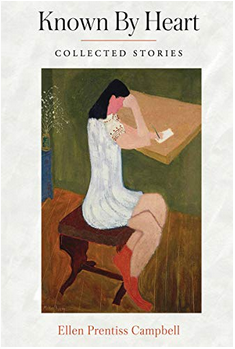Book Review: Known by Heart

Known by Heart, Ellen Prentiss Campbell, Apprentice House Press, 185 pp, 2020.
Fans of Ellen Prentiss Campbell’s work—from her earlier short story collection Contents Under Pressure and novel The Bowl with Gold Seams—know that there is nothing showy about her writing. It is understated, unadorned, much as the Quaker philosophy that often forms a theme in her work. But that is not to say that it is simple.
Her latest story collection, Known By Heart, is filled with quiet, nuanced stories of memory and yearning, betrayal and reconciliation, resentment and forgiveness, rekindling and extinguishing love, heartbreak in all its forms. These are stories of quotidian life, universal and instantly recognizable, and still electric with possibilities and surprise.
Geography links many of the stories here, in the rural heart of Bedford, Pennsylvania, but there are other links as well, and the delicacy of the connections across a number of these stories is part of their delight, as they offer another look, the unspooling of a deeper story. Still, many end on an unresolved note, a question hanging in the air. Here, as in life, there are no easy answers.
In the title story, “Known by Heart,” Alan watches as his wife Grace draws farther and farther into dementia, and pushes back against his daughter Frances’s increasing pressure to accept outside help, sure that he can be everything that Grace needs. Campbell’s recounting of each step on the downward spiral echoes painfully of Alan and Grace’s shared loss, though one that only he is bearing.
When they visit their farm and she wanders away in the middle of the night, neighbors and volunteer firefighters look for her. “Alan wanted to go along but he was marooned on deck while others dove in the sea of dark forest, trolling for Grace. He rang the bell. It was all he could do.”
That story is followed by “Estates and Trust,” which focuses on Alan and Grace’s daughters, Frances and Kate, sisters locked in a lifelong battle for primacy within the family. One of the few things that their mother could remember as she slipped farther into dementia was her husband’s one affair from decades ago, an event that Kate now realizes interrupted her own budding relationship, ended before it properly began. “She . . . stared into the embers of her father’s last fire. Time was what she wanted back. Non-refundable, non-renewable time.”
The fraught relationship of sisters is plumbed again, even more painfully, in “Duets and Solos,” as is the horrors of aging in the modern world, both as caregiver and patient, in “Ruby.”
Here, Campbell continues sketching the vivid, chilling portrait of assisted living she began in the title story. First, there are the relatives. As Ruby’s widower husband Pete thinks of his niece, Sheila, “She meant well, but her anxious voice and hover, her eagerness to solve his problems (and solve her problem: Pete) wore him out.” And, as Pete’s friend Helen remarks, the residents and their caregivers are together in being beneath society’s notice: “We’re invisible because we’re old. They’re brown.”
Grief stalks many of these stories, most painfully in “A Long Time to be Gone,” which is coupled with its prelude, “Out of This World,” a snapshot of harried mother Bonnie and her own mother, a retired teacher, talking on the phone as they watch the historic launch of the space shuttle Challenger, followed immediately by its explosion. The next story finds Bonnie and her family on a normal, crazy Saturday morning, trying to collect up the two girls and the dog to get to the soccer game. And—as we all know it can—from one second to the next, life changes forever.
To say that something is known by heart is to imply that it has been repeated, over and over, to the point that it is done without thought. But to know something by heart also says that it is loved, that it brings a measure of joy. Even when they are describing heartbreak, these stories, with their deeply abiding humanity, bring that measure of joy.
Jennifer Bort Yacovissi
Jenny Yacovissi grew up in Bethesda, Maryland, just a bit farther up the hill from Washington, D.C. Her debut novel Up the Hill to Home is a fictionalized account of her mother’s family in Washington from the Civil War to the Great Depression. In addition to writing historical and contemporary literary fiction, Jenny reviews regularly for the Washington Independent Review of Books and the Historical Novel Society. She belongs to the National Book Critic’s Circle and PEN/America. She also owns a small project management and engineering consulting firm, and enjoys gardening and being on the water. Jenny lives with her husband Jim in Crownsville, Maryland. To learn more about the families in Up the Hill to Home and see photos and artifacts from their lives, visit http://www.jbyacovissi.com/about-the-book.
- Web |
- More Posts(33)